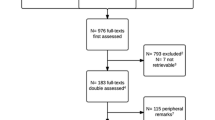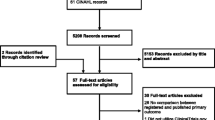Abstract
Background
Healthcare professionals and patients could be negatively influenced in their judgments by articles and meta-analyses presenting selective outcome reporting. Clinical trials should be transparent from inception to the publication of results. To this end, trial prospective registration is an ethical and scientific requirement that have shown to be effective in preventing selective reporting of outcomes. However, even journals with a clear pre-registration policy publish trial results that were retrospectively registered.
Situation
Analyses of registration of randomized clinical trials recently published in top specialty journals and of meta-analyses with suspicion of including trials with outcome reporting bias have shown that retrospective registration is in the range from 56 to 76 %. This translates into publication of primary endpoints that differ from those included in the registry: some 30 % of trials showed discrepancies between the primary endpoint in the trial registry and the article. Furthermore, it has been shown that 8 % of all clinical trials published by 6 high-impact ICMJE-member journals was retrospectively registered after primary endpoint ascertainment could have had taken place, raising concerns that endpoints may not have been pre-specified, or were changed. With regards to meta-analyses, 34 % of Cochrane systematic reviews included one or more trials with a high suspicion of selective reporting bias for the primary outcome.
Proposal
Retrospective registration of trials may foster selective outcome reporting unless journal editors implement specific quality control processes aiming to prevent or minimize this type of bias. Prospective registration of trials—and protocol public disclosure if proven effective in future studies—prevents outcome reporting bias, a must to ensure clinicians and patients have access to reliable clinical trial results. Journal editors should enforce, rather than encourage, appropriate measures to ensure publication of trials free of outcome reporting bias.
Similar content being viewed by others
References
WMA Declaration of Helsinki—Ethical Principles for Medical Research Involving Human Subjects. http://www.wma.net/en/30publications/10policies/b3/index.html
World Health Organization. International clinical trials registry platform (ICTRP). http://www.who.int/ictrp/trial_reg/en/
CONSORT (2010) Transparent reporting of trials. http://www.consort-statement.org/consort-2010
ICMJE. Recommendations for the Conduct, Reporting, Editing, and Publication of Scholarly Work in Medical Journals. Updated December 2014. http://www.icmje.org/icmje-recommendations.pdf
Emdin C, Odutayo A, Hsiao A, et al. (2015) Association of cardiovascular trial registration with positive study findings: epidemiological study of randomized trials (ESORT). JAMA Int Med 175:304–307
Kaplan RM, Irvin VL (2015) Likelihood of null effects of large NHLBI clinical trials has increased over time. PLoS One 10:e0132382
Reveiz L, Cortés-Jofré M, Asenjo Lobos C, et al. (2010) Influence of trial registration on reporting quality of randomized trials: study from highest ranked journals. J Clin Epidemiol 63:1216–1222
Viergever RF, Li K (2015) Trends in global clinical trial registration: an analysis of numbers of registered clinical trials in different parts of the world from 2004 to 2013. BMJ Open 5:e008932
Wager E, Williams P, Project Overcome failure to Publish nEgative fiNdings Consortium (2013) "Hardly worth the effort"? Medical journals' policies and their editors' and publishers' views on trial registration and publication bias: quantitative and qualitative study. BMJ 347:f5248
Dal-Re R, Ross JS, Marušić A (2016) Compliance with prospective trial registration guidance remained low in high-impact journals and has implications for primary endpoint reporting. J Clin Epidemiol 75:100–107
Killeen S, Sourallous P, Hunter IA, Hartley JE, Grady HL (2014) Registration rates, adequacy of registration, and a comparison of registered and published primary outcomes in randomized controlled trials published in surgery journals. Ann Surg 259:193–196
Mann E, Nguyen N, Fleischer S, Meyer G (2014) Compliance with trial registration in five core journals of clinical geriatrics: a survey of original publications on randomised controlled trials from 2008 to 2012. Age Ageing 43:872–876
Scott A, Rucklidge JJ, Mulder RT (2015) Is mandatory prospective trial registration working to prevent publication of unregistered trials and selective outcome reporting? An observational study of five psychiatry journals that mandate prospective clinical trial registration. PLoS One 10:e0133718
De Oliveira GS Jr, Jung MJ, McCarthy RJ (2015) Discrepancies between randomized controlled trial registry entries and content of corresponding manuscripts reported in anesthesiology journals. Anesth Analg 121:1030–1033
Rayhill ML, Sharon R, Burch R, Loder E (2015) Registration status and outcome reporting of trials published in core headache medicine journals. Neurology 85:1789–1794
van Lent M, IntHout J, Out HJ (2015) Differences between information in registries and articles did not influence publication acceptance. J Clin Epidemiol 68:1059–1067
PLoS Medicine http://journals.plos.org/plosmedicine/s/submission-guidelines; PLoS ONE http://journals.plos.org/plosone/s/human-subjects-research; PLoS Neglected Tropical Diseases http://journals.plos.org/plosntds/s/submission-guidelines
BioMed Central. Editorial policies. http://www.biomedcentral.com/about/editorialpolicies
All Trials initiative. All trials registered; all trials reported. September 2013. http://www.alltrials.net/wp-content/uploads/2013/09/What-does-all-trials-registered-and-reported-mean.pdf
Walker KF, Stevenson G, Thornton JG (2014) Discrepancies between registration and publication of randomised controlled trials: an observational study. JRSM Open 5:2042533313517688
Goldacre B, Drysdale H, Dale A, et al. The COPMare project. http://compare-trials.org/
Hartung DM, Zarin DA, Guise JM, McDonagh M, Paynter R, Helfand M (2014) Reporting discrepancies between the ClinicalTrials.gov results database and peer-reviewed publications. Ann Intern Med 160:477–483
Becker JE, Krumholz HM, Ben-Josef G, Ross JS (2014) Reporting of results in ClinicalTrials.gov and high-impact journals. JAMA 311:1063–1065
Huić M, Marušić M, Marušić A (2011) Completeness and changes in registered data and reporting bias of randomized controlled trials in ICMJE journals after trial registration policy. PLoS One 6:e25258
Scherer RW, Huynh L, Ervin A-M, Dickersin K (2015) Using ClinicalTrials.gov to supplement information in ophthalmology conference abstracts about trial outcomes: a comparison study. PLoS One 10:e0130619
Chan AW, Tetzlaff JM, Altman DG, et al. (2013) SPIRIT 2013 statement: defining standard protocol items for clinical trials. Ann Intern Med 158:200–207
Dal-Ré R, Bracken MB, Ioannidis JP (2015) Call to improve transparency of trials of non-regulated interventions. BMJ 350:h1323
Kirkham JJ, Dwan KM, Altman DG, et al. (2010) The impact of outcome reporting bias in randomised controlled trials on a cohort of systematic reviews. BMJ 340:c365
Reid EK, Tejani AM, Huan LN, et al. (2015) Managing the incidence of selective reporting bias: a survey of Cochrane review groups. Syst Rev 4:85
Viergever RF, Karam G, Reis A, Ghersi D (2014) The quality of registration of clinical trials: still a problem. PLoS One 9:e84727
Thaler K, Kien C, Nussbaumer B, et al. (2015) Inadequate use and regulation of interventions against publication bias decreases their effectiveness: a systematic review. J Clin Epidemiol 68:792–802
Smith V, Clarke M, Williamson P, Gargon E (2015) Survey of new 2007 and 2011 Cochrane reviews found 37% of prespecified outcomes not reported. J Clin Epidemiol 68:237–245
Jamtvedt G, Klemp M, Mørland B, Nylenna M (2015) Responsibility and accountability for well informed health-care decisions: a global challenge. Lancet 386:826–828
Hudson KL, Collins FS (2015) Sharing and reporting the results of clinical trials. JAMA 313:355–356
Hooft L, Korevaar DA, Molenaar N, Bossuyt PM, Scholten RJ (2014) Endorsement of ICMJE's clinical trial registration policy: a survey among journal editors. Neth J Med 72:349–355
Dal-Ré R, Caplan AL (2015) Journal editors impasse with outcome reporting bias. Eur J Clin Investig 45:895–898
UK NHS Health Research Authority. HRA Clinical Trial Registration Deferral Policy and Procedure. 2014. http://www.hra.nhs.uk/documents/2015/08/hra-clinical-trial-registration-deferral-policy-procedure-v-1-6-19-08-15.pdf
Odutayo A, Altman DG, Hopewell S, Shakir M, Hsiao AJ, Emdin CA (2015) Reporting of a publicly accessible protocol and its association with positive study findings in cardiovascular trials (from the epidemiological study of randomized trials [ESORT]). Am J Cardiol 116:1280–1283
Moher D, Glasziou P, Chalmers I, et al. (2016) Increasing value and reducing waste in biomedical research: who's listening? Lancet 387:1573–1586
Goldacre B (2015) How to get all trials reported: audit, better data, and individual accountability. PLoS Med 12:e1001821
Dal-Re R, Ioannidis JP, Bracken MB, et al. (2014) Making prospective registration of observational research a reality. Sci Transl Med 6:224cm1
André F, McShane LM, Michiels S, et al. (2011) Biomarker studies: a call for a comprehensive biomarker study registry. Nat Rev Clin Oncol 8:171–176
Jansen of Lorkeers SJ, Doevendans PA, Chamuleau SA (2014) All preclinical trials should be registered in advance in an online registry. Eur J Clin Investig 44:891–892
Miguel E, Camerer C, Casey K, et al. (2014) Social science. Promoting transparency in social science research. Science 343:30–31
Booth A, Clarke M, Dooley G, et al. (2013) PROSPERO at one year: an evaluation of its utility. Syst Rev 2:4
American Economic Association. The American Economic Association’s registry for randomized clinical trials. https://www.socialscienceregistry.org/site/instructions
Weber WE, Merino JG, Loder E (2015) Trial registration 10 years on. (edit). BMJ 351:h357
Academy of Medical Sciences. Reproducibility and reliability of biomedical research: improving research practice. Symposium Report. October 2015. http://www.acmedsci.ac.uk/viewFile/56314e40aac61.pdf
Kien C, Nußbaumer B, Thaler KJ, et al. (2014) Barriers to and facilitators of interventions to counter publication bias: thematic analysis of scholarly articles and stakeholder interviews. BMC Health Serv Res 14:551
Meerpohl JJ, Schell LK, Bassler D, et al. (2015) Evidence-informed recommendations to reduce dissemination bias in clinical research: conclusions from the OPEN (overcome failure to publish nEgative fiNdings) project based on an international consensus meeting. BMJ Open 5:e006666
Chan AW, Song F, Vickers A, et al. (2014) Increasing value and reducing waste: addressing inaccessible research. Lancet 383:257–266
Taichman DB, Backus J, Baethge C, et al. (2016) Sharing clinical trial data: a proposal from the International Committee of Medical Journal Editors. PLoS Med 13:e1001950
Shamseer L, Roberts J (2016) Disclosure of data and statistical commands should accompany completely reported studies. J Clin Epidemiol 70:272–274
Goldacre B (2016) Make journal report clinical trials properly. Nature 530:7
Allison DBR, Brown AW, George BJ, Kaiser KA (2016) A tragedy of errors. Nature 530:27–29
Author information
Authors and Affiliations
Corresponding author
Ethics declarations
Conflicts of interest
The authors declare that they have no conflicts of interest.
Funding
This work was not supported by any external grants or funds. The authors assume full responsibility for the accuracy and completeness of the ideas presented.
Additional information
Authors’ contributions
RDR conceived the idea and wrote the first draft of the manuscript. AM made substantial revisions to the manuscript for important intellectual content. Both authors critically revised and approved the final version of the manuscript and are accountable for all aspects included in it.
Rights and permissions
About this article
Cite this article
Dal-Ré, R., Marušić, A. Prevention of selective outcome reporting: let us start from the beginning. Eur J Clin Pharmacol 72, 1283–1288 (2016). https://doi.org/10.1007/s00228-016-2112-3
Received:
Accepted:
Published:
Issue Date:
DOI: https://doi.org/10.1007/s00228-016-2112-3




